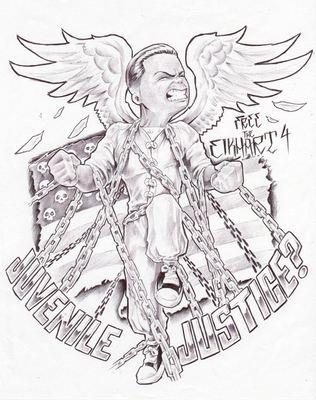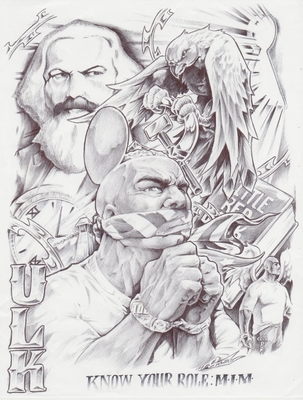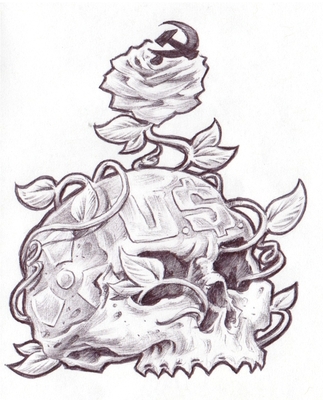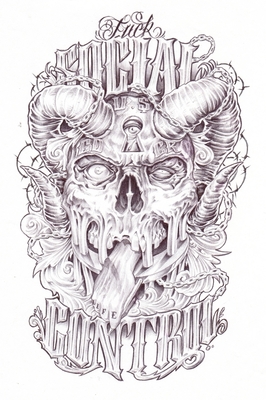
Settlers Instigate Violence in First Nation Village
On May 1, in the northern Alaska village of Tanana, two state troopers were shot to death after being sent to the remote Alaska Native village to arrest a resident for misdemeanor violations including driving without a license and threatening a village public safety officer. The man’s son shot the troopers as they entered into a physical altercation to arrest him.
The issue has been sensationalized in the bourgeois press as an extreme tragedy involving the deaths of the officers who were killed “in the line of duty.” The young man who fired the shots is being vilified by the media as a murderer and arch-villain guilty of killing two cops who are painted as heroes and outstanding individuals. As droves of white settlers attended the long procession of police cars carrying and escorting the bodies of the troopers from the medical examiner to the airport in Anchorage, hands over hearts and tears in eyes, nary a word is to be heard in lament of the destruction of a young First Nation life and family. Upon further, deeper examination however, a picture emerges which places the emphasis on First Nation repression, police-state tactics, and a long history of neglect by the white ruling class of its oppressed, dependent and dominated rural native population.
It was not native or even just local law enforcement which came to intervene and attempt to take into custody the alleged offender, it was white outsiders who needed to be flown in from a far distant regional hub in the tradition of the imperialist colonial model. These intruders have no personal ties to such communities and they naturally are viewed with resentment and suspicion. This sort of “law enforcement” is seen as arbitrary, external, and illegitimate by many who are forced to recognize its jurisdiction at the barrel of a gun. It is also increasingly being challenged.(1)
At first glance, what would appear to have happened in this particular situation is that a local individual who was transgressing some relatively petty ordinances or laws (which, by the way, are mostly foisted upon the First Nation people by white settlerism from far-off white legislatures and courts) was confronted by what passes for law enforcement in most rural villages - a VPSO, or “village public safety officer.” The alleged offender did not want to cooperate with the VPSO and threatened him. The VPSO then contacted state troopers. The troopers were eventually flown in, attempted to arrest said individual and a struggle ensued after the man resisted arrest. The man’s son, upon witnessing this altercation, grabbed a firearm and shot the troopers in defense of his father. The media is portraying the son as a “cowardly and selfish” criminal who killed two of Alaska’s finest. But let’s now dig more below the surface to understand the real elements behind this unfortunate circumstance.
The father and son are connected with a group called the Athabascan Nation (Athabascan being their particular native tribe). This group denies the authority of the state over native lands. They have also questioned and challenged the authority of the VPSOs.(2)
The position of VPSO was created by the state legislature. Instead of allowing First Nation sovereignty, and also even allotting appropriate funding for tribes to create their own, this was the state’s way of providing a law enforcement presence in villages.
Most VPSOs are the equivalent of a native “Uncle Tom,” a puppet of the “man.” Though it is only the equivalent of putting a band aid over a gaping wound, many tribes in the south have been granted a form of limited sovereignty under a set of laws incongruously titled “Indian Country.” The Navajo Reservation in New Mexico is an example. However, in Alaska, a clever piece of settler legislation called the Alaska Native Claims Settlement Act killed “Indian Country” sovereignty in Alaska and instead regional “corporations” were set up, which in turn were given lucrative contracts on oil and mineral exploitation (most of which is still dominated by Euro-Amerikan multinationals like BP and Exxon anyway). These corporations make considerable amounts of money for a relatively few shareholders while providing limited health care and other services but little else. In other words, it was and is the Euro-Amerikan exploiter class’s way of bribing a significant enough portion of Alaska natives to be content with being an otherwise plundered and oppressed colonial, subjected people. This has effectively kept most pacified, while corporations appropriate natural resources, including oil, gas, minerals, timber, fish, etc, worth billions of dollars to the ruling class exploiters.
In order to maintain complete control over these lands, the white plunderer ruling class has even imposed their own arbitrary laws and regulations on the First Nation peoples’ way of life – their traditional and time-honored means of subsistence. As an example, state fish and game officers forcefully prevent indigenous peoples from harvesting food resources that they have for thousands of years, in the name of preserving stocks and preventing depletion (so that great white hunters won’t run short on sport-hunting). They are then forced onto the rolls of social welfare programs such as food stamps, thereby making them into a totally dependent population. The social evils this has produced are numerous and horrendous, including creating feelings of inadequacy and worthlessness amongst a formerly proud and self-sustaining, independent people and therefore contributing in large part to the extremely high rates of suicide and drug/alcohol dependency and in effect inflicting another indirect genocide on the First Nation peoples.
There is, of course, something patently obscene with a nation who have historically been the biggest polluters and foulers of the earth imaginable telling those engaged in indigenous practices that have proved sustainable over generations what they can and can’t do on their land. From over-fishing by commmercial fisheries, mines like Pebble Copper and Usibelli Coal and, of course, fossil fuel extraction, Amerikan dominance of the Alaskan territories has brought ecological disaster. This March was the 25th anniversary of the Exxon Valdez oil spill, which dumped 11 million gallons of crude oil into Prince William Sound, killing hundreds of thousands of shorebirds. While bird populations are recovering, others have not, including the local Orca populations that have continued to decline since the spill.(3) And that’s only beginning to scratch at the surface of the farcical nature of white colonial rule.
Returning to the VPSO issue, it can be seen they are only a quisling representative of white colonial rule and are additionally so powerless that they all are even unarmed, making them completely dependent on state enforcement. Tribal councils themselves are little more than puppet shows. Tribal authorities rarely challenge state rule or push for sovereignty because they are, for the most part, bought-off. They don’t want to lose state funding and corporate backing or jeopardize their own salaries and positions. Members of the Athabascan Nation and other similar groups recognize this and fight against their treachery and hypocrisy. Unfortunately, the latest action against the troopers by an over-idealistic and perhaps protective young man amounts to focoism that has destroyed his life, but this has shed a lot more light on the need for natives to assert far more control and autonomy over their own affairs separate from state interference.
Showing their complete disregard for their own and their status as lapdogs of state authority, the tribal council of Tanana moved to banish the man troopers came to arrest as well as another “aggressive” member of the Athabascan Nation, calling them “intolerant.” Why not also banish outside, militant and aggressive officers of an oppressive regime bent on stealing and keeping your land? They’d rather banish two of their own? This speaks volumes.
In contrast, even the young man who is accused of shooting the cops seems to have had a better grip on who his real friends and enemies were, as, even though he also drew a bead on the native VPSO who was present, he lowered his gun and declined to harm him. This in itself speaks loudly for the need for tribes to govern and police themselves. It is far harder to harm someone you identify with or know, than it is someone you have had no interaction with and view as a foreign aggressor. It is also interesting that after the shootings, the local VPSO was able to take the young man into custody with the help of a few community members without further incident. So clearly, this was not, contrary to most media reports, a case of an out-of-control, criminally minded and dangerous coward, but a young First Nation man coming to the defense of his father who was being accosted and assaulted without due cause by an aggressive, militant and foreign force he did not recognize and rightfully viewed with hostility and distrust.
Not very surprisingly, even reformist measures such as the concept of “Indian Country” are vehemently opposed by the state government. If enacted, this would take away state authority and create a dual-legal system on the small amount of tribal (vs. corporate) lands that would become “Indian country.”(4) In other words, the white settler state might lose its ability to fully plunder and loot the First Nation people and their land, and lose its ability to legally impose its will on the people by force.
We must fight for the national self-determination of First Nations. The imperialists must be forced to end their absolute hegemony and domination over the indigenous populations and the vast wealth of their country. The First Nation people must not be subjected to a cruel, indirect genocide and forced assimilation into white Euro-Amerikan “culture,” with all its comparatively decadent values, fetishization of money, and inherent corruption.
The only solution is the revolutionary one - to support and accept nothing less than full First Nation sovereignty for all indigenous peoples.












